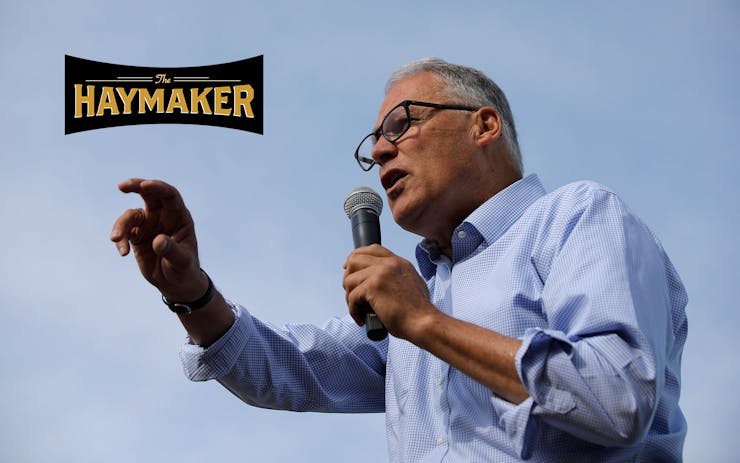‘The Haymaker’ is Leafly Deputy Editor Bruce Barcott’s opinion column on cannabis politics and culture.
Midway through his contentious press conference announcing a ban on flavored vape products on Friday, Gov. Jay Inslee blew the room’s hair back. “Look, when you addict a 12-year-old kid to nicotine, you’re just wrong,” he said, outraged, in response to an audience member who defended the nicotine vaping industry.
Airplanes are falling out of the sky. Gov. Jay Inslee responded by banning buses.
Most of the nation knows the Washington state governor as a climate-change crusader, the one-issue Democratic presidential candidate. But he’s known here in the Evergreen State as an even-keeled good-government liberal.
On Friday, he responded to the nationwide outbreak of vape-related pulmonary injuries (VAPI) by imposing an ill-conceived emergency ban on all flavored nicotine vape products. He excoriated the nicotine vape industry for getting kids hooked on bubblegum-flavored vape juice. Protect the children!
Wrong on this one, Governor
Gov. Inslee, I love ya. Voted for you twice. You’re my Bainbridge Island neighbor. On this issue, you are mistaken. Airplanes are falling out of the sky and you just announced a ban on buses.
Inslee and a dozen state and local officials spent an hour on Friday conflating the VAPI lung injury outbreak with American teens Juul-ing in high school bathrooms. Meanwhile, on the same day, the federal Centers for Disease Control (CDC) issued a study confirming illegal-market THC vape cartridges as the likeliest VAPI cause—not legal flavored vaping liquid.
Inslee’s ban followed Massachusetts Gov. Charlie Baker’s four-month statewide ban on all vaping products, including state-licensed cannabis cartridges (Inslee’s ban does not cover legal, state-licensed cannabis products). Michigan, New York, and Rhode Island have also imposed temporary bans on flavored vape products. Los Angeles is now considering a citywide ban on all vape products, including cannabis. Other cities and states will likely follow.
Illegal cannabis carts the likely cause
These bans make no sense. As Leafly has shown, and CDC evidence continues to confirm, the likeliest VAPI culprit is a cutting agent introduced to illegal-market THC vape cartridges in late 2018. This cutting agent uses vitamin E oil (tocopheryl acetate) as its base.
Flavorings most likely have nothing to do with it. Flavored nicotine juice has existed for years with no VAPI problems. But flavorings have everything to do with optics and politics.
In previous years, Inslee tried to ban flavored nicotine vape products. Republicans in the state legislature foiled him. So now he’s using the VAPI lung outbreak as cover to get the job done. It’s a move Dick Cheney invented after 9/11—when Al Qaeda attacks, use it as cover to do what you’ve been itching to do for years: invade Iraq.
Inslee: ‘There’s no evidence’
Anybody who’s been looking seriously at VAPI recognizes this. Inslee and his officials admitted as much on Friday. “There’s no evidence at the moment that flavoring is the cause of this [VAPI] disease,” Inslee said. “But addiction to vaping nicotine is leading to the disease.”
No, it’s not.
Once more for the bureaucrats in Olympia, Boston, Albany, Lansing, and Providence: Nicotine flavorings have been used for years without any VAPI outbreak.
The best current evidence indicates that people in non-legal cannabis states, who are denied the opportunity to purchase licensed, lab-tested products, turned to the street market. In late 2018, illegal cannabis vape cartridges cut with tocopheryl acetate (vitamin E oil) began turning up in the street market nationwide. Some of the earliest reports of VAPI came from Wisconsin, where law enforcement authorities allege the Huffhines brothers, Tyler and Jacob, ran an illicit THC vape pen factory that turned out thousands of heavily cut carts every day.
Here’s what the CDC says
A couple hours prior to Gov. Inslee’s Friday press conference, the CDC’s Morbidity and Mortality Weekly Report issued a study of 86 VAPI patients. These are folks in the Huffhines region—Wisconsin and Illinois. Nearly 90% of those patients reported using a street-market THC cartridge in the previous three months. Only 11 patients (13% of the total) said they used nicotine vapes only. The CDC report emphasized: “In particular, the high level of use of prefilled THC cartridges, used in a range of different devices, suggests that the cartridges might play an important role.”
Gov. Inslee: If you believe flavored nicotine vape products should be outlawed, press that issue on its merits. But don’t confuse the public in order to take political advantage of the VAPI lung outbreak.
The real work: regulating cart ingredients
After Inslee exited the conference, I asked Rick Garza, Executive Director of Washington’s Liquor and Cannabis Board (LCB), if the state’s cannabis consumers could be confident that state-licensed products did not contain toxic cutting agents. “We can’t guarantee that,” Garza told me. “Which is why we’re advising people to stop using all vaping products right now.”
It was an honest answer. Although nearly all VAPI cases have come from street-market carts, no legal state currently prohibits the use of vitamin E oil in licensed cannabis carts. That’s not the fault of state agencies; until last month almost nobody knew this stuff existed. Cannabis labs just started offering a test for it two weeks ago. Garza’s agency is now consulting with legal cannabis vape cart makers and retailers to figure out how to keep those toxic thickeners out of the state supply.
What’s not honest is pretending to protect the public from the VAPI outbreak by banning a legal product that is not the leading suspect in its cause. By doing so, public officials like Inslee and Massachusetts Gov. Baker are sending tens of thousands of consumers to the illegal market—which is exactly where the toxic lung products are lurking.





